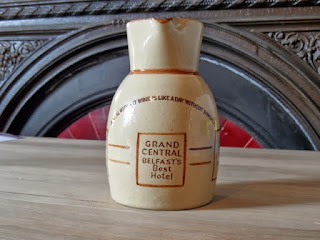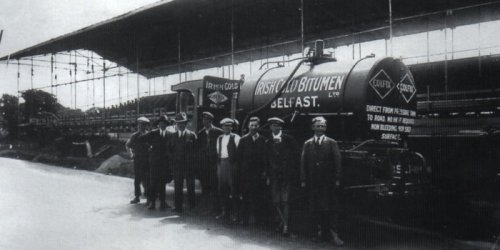The Grand Central Hotel was a virtual palace in the middle of Belfast. It had been funded and founded by Ulster-Scot retailer and department store owner John Robb in 1893. He was the father of Nesca Robb; he introduced her to the books of WG Lyttle and encouraged her to take an interest in local history and our cultural and linguistic links with Scotland. It had 200 bedrooms and electricity and when it opened it was described in the press as "undoubtedly the largest and finest hotel in Ireland, and one of the largest and finest in the kingdom".
But in September 1917 the magnificent hotel and its contents were requisitioned by the Government as part of the war effort. It was then used to provide accommodation for around 500 soldiers and was also a recruiting station where thousands of men from across the island signed up. But when the war ended, Robb didn't get it back. Hopefully he was 'looked after'.
• New Nation, New Future for the Hotel
In 1921 Northern Ireland became a new jurisdiction and the old hotel was a dire eyesore in the middle of Belfast's swish Royal Avenue. The Ulster Tourist Development Association had been set up and had big plans. International events were being planned. The regeneration of the Grand Central would in many ways be emblematic of the new nation, a post-War message to the world. Enter the entrepreneurs.
In early July 1926 the hotel was bought "on behalf of a syndicate" by Hugh Smylie, a chartered accountant and prominent civic figure, and Sir Crawford McCullagh.
In late July it was announced that a 50 year lease for the premises had been agreed with 45 year old Scottish hotelier and restaurateur John Grant of Glasgow, at a rent of £4,500 per year, announcing that "no expense will be spared on decorating and furnishing the hotel".
• The Grant Empire
John Grant might have been related to the William Grant who in 1886 had founded the Glenfiddich Distillery in Banffshire - this 1999 legal case shows how potentially confusing the two brand names became.
John was born somewhere in the north of Scotland in 1881 but moved to Bearsden and set up a laundry, and then a sweet shop and grocers in Maryhill. He opened his first restaurant in Govan, in 1920 bought and redeveloped the Royal Restaurant in Glasgow and in 1923 bought The Rosevale also in Glasgow. Other operations that he and his sons John G. Grant and Daniel (Don) C. Grant owned included the famous Rogano seafood restaurant, the Grant Arms Garden Lounge and Grill and also the Buchanan Arms Hotel in Drymen north of Glasgow near Loch Lomond. The company was later renamed John Grant (Wines and Food) Limited.
I have a jug from the time which I have blogged about before, which commemorates four of the Grant owned businesses:


John Grant already had business interests in Ulster; he had been Chairman of Irish Cold Bitumen Ltd of Stranmillis, Belfast. The firm resurfaced the 13 mile Ards TT motor race course (link here). Days after the agreement of the hotel lease, Grant made a legal application to renew the dormant alcohol licence for the hotel. In the application, he gave his address as Strathearn, Broomhill Park, Stranmillis Road – the address of William Hood Thomson, the owner of the bitumen business. Back in 1913 Thomson had business interests in Scotland with a company called Fergusson Brothers and Thomson which was based in Glasgow and which made and sold various oil, paint and varnish products. So maybe they'd known each other for many years.

In a hearing on August 1926 John Grant's legal representative T. J. Campbell K.C. outlined an impressive vision for the building and the regenerative effect its restoration would have on the city. The licence was approved. An investors prospectus was published in the press at the end of October 1926; the new company was named The Grand Central Hotel (Belfast) Ltd, with five directors. Just one of them - Thomson - was from Belfast.
• The Official Reopening
The new hotel was officially opened on 31 March 1927 with Viscount Craigavon, the Prime Minister of Northern Ireland, the guest of honour. The Northern Whig report below is packed with cultural resonances –
• "The heartiest good feeling on all sides"
An interesting dimension to all of this is that John Grant was a Catholic and his son Daniel C Grant was educated in Glasgow at St Aloysius School. Today some will insist that Craig's new Northern Ireland was an Orange or Protestant dominated 'regime'. Grant was warmly welcomed to Northern Ireland to take over its most prestigious hotel and, it appears from the article above, that the respect and comfort was mutual. The hotel was the glamorous centrepiece of the city's tourist offering for decades to come.
• Death, Will and Funeral
John Grant died on 5 January 1945, aged 63 at his townhouse home at 40 Kingsborough Gardens in Glasgow. His will left £870,205 and 43,689 gallons of whisky which was auctioned off for a value of £655,342, as well as (according to the Daily Record on 3 February 1945) stocks of port and sherry in the distilleries of Ardbeg, Glenfiddich, Glenlivet, Glen Grant, Carsebridge, Clynelick, Cameronbridge and Strathclyde. Death duties were set at a colossal £430,109.
His funeral took place half a mile from his home at St Peter's Catholic Church at Hyndland Street, Partick.








0 comments:
Post a Comment